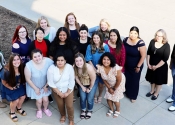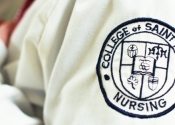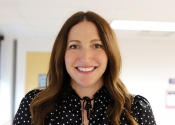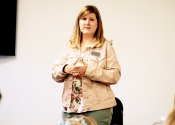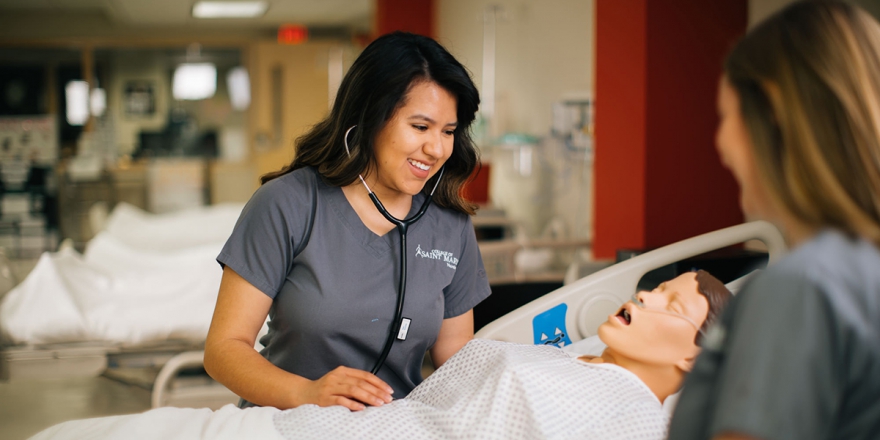
CSM nursing student leaves comforts at home to serve in rural Appalachia
OMAHA, Neb. – Last summer, Dania Cervantes Ayala stepped into an intimidating scene. A self-described “city girl” who was born in Mexico and has spent the last 16 years in Omaha, she found herself interning deep in rural Appalachia — no cell service, no paved roads, unfamiliar surroundings and wary, suspicious glances.
“I was in an underserved and rural area,” says Cervantes Ayala. “It was very different. The culture, population, people, and traditions were nothing like here. You’re in the mountains. You have gravel roads and one-way streets.”
Cervantes Ayala was there as part of Frontier Nursing University’s Courier Program, a selective internship for students interested in high-impact service learning and immersion in public health settings. But she didn’t flinch at the strange new environment. Instead, she responded the only way she knew how: with compassion. She began an 8-week mission to bring service and community to the people of rural Kentucky.
During the internship, Cervantes Ayala worked at Hometown Clinic and Bluegrass Care Navigators, providing care to locals in need, including many people struggling with opioid addiction. For a service project, she led a drive that helped provide hygiene products, school supplies, and food to local families. On weekends, she helped out at Remote Area Medical (RAM), a clinic that provides free healthcare to impoverished people. She spent extra free time working at a local coffee shop, which directly used proceeds to help support a food pantry next door. All the while, she was serving and leading within a foreign, rural, and culturally-rooted area.
“Being an outsider is one of the hardest things,” she says. “People don’t like change, and having an outsider come in and say, ‘Hey, we’re trying to implement this into your community.’ People weren’t fond of that at the very beginning … They’ve lived there all of their lives, and we’ve only been there a couple of weeks.”
In rural Kentucky, her seemingly isolated setting was a far cry from what she had become accustomed to in her previous four years of study at College of Saint Mary (CSM). In fact, the campus’ inclusive nature is what drew her to the school in the first place. A first-generation student with Latina roots, she first came in contact with the College through CSM’s annual Latina Summer Academy, a week-long program that gives Latina high schoolers a chance to engage on campus in science, technology, engineering, arts, and math activities. When she realized how tight-knit the community really was, she says she knew it was a good fit.
“The emphasis on being a first-generation student and Latina drew me in because of all of the support and the many other Latinas here on campus,” she says. “Just having [advisors’] guidance and a role model who comes from the same cultural background as I do, who really understands the struggle of either a first generation, immigrant, or even a Latina or woman in general, has really helped because they understand where I’m coming from and understand me as a person.”
Still, long before entering the Courier internship program, she had to learn to overcome challenging environments. Beyond being a first-generation student and an immigrant who had come to Nebraska at age 6, she faced the challenge of being undocumented as a teenager. So, when she was told she would be able to attend CSM on the College’s unique Misericordia Scholarship – a scholarship presented to undocumented students from diverse backgrounds who are not eligible for federal financial assistance – she says she was ecstatic to have found a perfect college home and a path to a degree.
“I came with my mom and cried right on the spot,” she recalls. “My mom and dad only went to elementary school in Mexico…It wasn’t just an accomplishment for me, it was a family accomplishment.”
Once at CSM, where she had access to a host of new opportunities and resources, she dove in. She participated in a range of service opportunities, quickly completed a Spanish minor and earned a Medical Interpreting Certificate.
It was in this same campus community that she was exposed to the Courier program during a presentation by one of her colleagues. She says the experience followed a theme echoed throughout her CSM experience – one where she found outlets and resources that matched her desire to positively change the lives of others.
“My nursing instructors really introduced us to the world in terms of public health, different careers, and internship opportunities,” she says.
In Appalachia, she worked to build connections to break down social barriers and get to know the individual needs of local people. She says that even beyond setting up systems to help individuals, bonding with the people in rural Appalachia was a life-changing experience.
“I think the most rewarding thing was actually getting to know the community and these people,” she says. “As a companion, even though I have a nursing background, I was just there to keep them company…They gave me some of the best hours of my life.”
She says she also saw new possibilities for her future that she hadn’t considered.
“As a volunteer, I saw the impact that you could make by just dedicating a couple hours to people in need,” she says. “That’s what I want to do, not just work in a hospital or clinic but also on my weekends off go out and be a part of programs like RAM.”
Cervantes Ayala expects to graduate with a Bachelor of Science in Nursing in May 2019. After graduation, she plans to apply to a Doctor of Nursing Practice (DNP) program in order to become a Pediatric Primary and Acute Care Nurse Practitioner.






